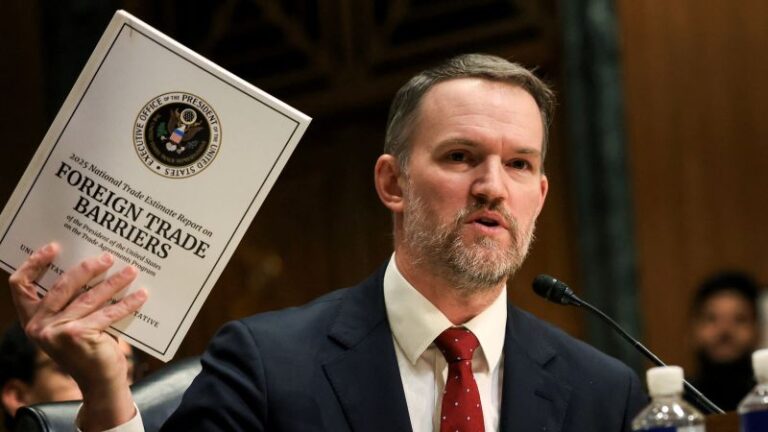Trump’s Tariff Pause Sparks Controversy Among Trade Officials
Location: Washington
Source: CNN
Trade Official Out of the Loop
The U.S. Trade Representative Jamieson Greer revealed that he was not informed of President Donald Trump’s 90-day pause on most new tariffs until after it was publicly announced. This revelation raised eyebrows, particularly during a House hearing where Greer defended Trump’s existing trade policies.
Timing and Implications of Trump’s Announcement
Amidst Greer’s testimony, President Trump took to social media to announce that additional tariff hikes on numerous countries would be delayed for 90 days, effective immediately but excluding China. The timing coincided with Trump’s earlier planned tariff increase which had been described by Fitch Ratings as the most substantial in 200 years, potentially influencing inflation and economic growth.
Confusion in the Administration
During the hearing, Democratic Rep. Steven Horsford questioned Greer about when he learned of the tariff pause, to which Greer admitted the decision had just been made moments earlier. Horsford commented, “It looks like your boss just pulled the rug from under you,” highlighting the apparent disarray within the administration regarding trade policy communication.
Perspective on Policy Change
Greer acknowledged that he had knowledge of potential changes ahead of time, but when directly asked if he knew the pause was imminent, he sidestepped the question, indicating that various options are regularly discussed within the administration. This lack of clarity raised further questions about who is making crucial decisions regarding trade policies.
Continuing Trade Deficit and Global Negotiations
During the session, Greer recognized the U.S. trade deficit as an “emergency,” justifying Trump’s sweeping overhaul of trade policies. He emphasized that the president remains open to negotiation with various countries, including recent discussions with leaders from the European Union, South Korea, Ecuador, and Mexico.
Escalating Tensions with China
The U.S. and China continue to engage in a tit-for-tat trade war, with tariffs on Chinese goods recently raised to 125%. Prior to Trump’s tariff announcement, China had retaliated with 84% tariffs on U.S. imports, illustrating the escalating tension between the two economic superpowers.
Global Backlash and Future Negotiations
In response to Trump’s tariffs, the European Union swiftly moved to implement countermeasures against the 25% duties imposed on steel and aluminum imports, expressing a desire for negotiated outcomes that would benefit both parties. Meanwhile, domestic voices, including Republican Rep. Jason Smith, have indicated serious trade issues, particularly in the agriculture sector with the EU.
Conclusion
The ongoing developments in U.S. trade policy under President Trump have not only stirred internal confusion but have also heightened international tensions. As discussions continue with various countries, the effectiveness and implications of these trade strategies remain to be seen.
